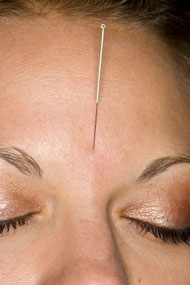Acupuncture combined with moxibustion is more effective than conventional ‘western’ medicine for the treatment of irritable bowel syndrome (IBS). A new meta-analysis of 11 research investigations with a sample size of over 950 patients shows that acupuncture with moxibustion leads to better clinical outcomes than conventional pharmaceutical drug therapy. In addition, the study shows that acupuncture combined with moxibustion is not only effective but is also safe. The researchers conclude, “Acupuncture-moxibustion for irritable bowel syndrome is better than the conventional western medication treatment.”
 Acupoint Relaxation This is not the first time Chinese medicine has been shown effective for the treatment of irritable bowel syndrome. The Journal of the American Medical Association made an impact in the western world with its ground breaking publication of findings showing that Chinese herbal medicine “offer(s) improvements in symptoms for some patients with IBS.” This early study used the modern standards of investigation now commonly employed in acupuncture and herbal medicine studies. It was a randomized, double-blind, placebo-controlled trial. Gastroenterologists worked in combination with herbalists but both groups were blinded to the treatment group. The study discovered that Chinese herbal medicine improved patients’ health with irritable bowel syndrome including significant improvements documented 14 weeks after completion of the herbal medicine treatments.
Acupoint Relaxation This is not the first time Chinese medicine has been shown effective for the treatment of irritable bowel syndrome. The Journal of the American Medical Association made an impact in the western world with its ground breaking publication of findings showing that Chinese herbal medicine “offer(s) improvements in symptoms for some patients with IBS.” This early study used the modern standards of investigation now commonly employed in acupuncture and herbal medicine studies. It was a randomized, double-blind, placebo-controlled trial. Gastroenterologists worked in combination with herbalists but both groups were blinded to the treatment group. The study discovered that Chinese herbal medicine improved patients’ health with irritable bowel syndrome including significant improvements documented 14 weeks after completion of the herbal medicine treatments.
Clinical Highlights
One effective herbal formula used for the treatment of irritable bowel syndrome is Shu Gan Wan. Often referred to as soothe the liver pills, this formula is known for its ability to prevent Liver Qi stagnation from attacking the Spleen and Stomach. This syndrome is indicated by abdominal discomfort and gas, bloating, hiccups, belching, abdominal pain, erratic stools and poor digestion. In some cases, hypoglycemia or ulcerative gastritis develops. This syndrome is common when emotional, physical and dietary stresses cause stomach and digestive upset. Irritability and anger during or after eating is a common example of when Liver Qi stagnation attacks the Stomach and Spleen. This is why Chinese medicine doctors often recommend not reading the newspaper during meals or eating in rush or under pressure.
One effective acupuncture point for the treatment of irritable bowel syndrome is LV13 (Zhangmen, Completion Gate). LV13 is the Front Mu point of the Spleen, the Influential point of the Zang organs and is the meeting point of the Liver and Gallbladder channels. This point harmonizes the Liver and Spleen and regulates both the middle and lower burners (jiao). Located anterior and inferior to the free end of the 11th rib, this point is never needled deeply and has many benefits to the digestive system. Indications for the use of this point include pain in the hypochondrium, diarrhea, indigestion, vomiting and abdominal distention.
References:
Zhongguo Zhen Jiu. 2012 Oct;32(10):957-60. [Meta analysis of acupuncture-moxibustion in treatment of irritable bowel syndrome]. Pei LX, Zhang XC, Sun JH, Geng H, Wu XL. Acupuncture and Rehabilitation Department, Jiangsu Province Hospital of TCM, Nanjing, China.
JAMA. 1998 Nov 11;280(18):1585-9. Treatment of irritable bowel syndrome with Chinese herbal medicine: a randomized controlled trial. Bensoussan A, Talley NJ, Hing M, Menzies R, Guo A, Ngu M. Research Unit for Complementary Medicine, University of Western Sydney Macarthur, Campbelltown, New South Wales, Australia.

